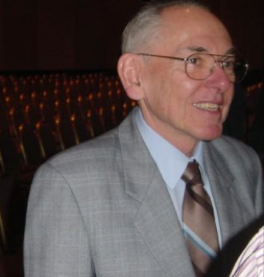In Memory: John Ohala
 August 28, 2020 | Written by Nelson Morgan, former director of ICSI
August 28, 2020 | Written by Nelson Morgan, former director of ICSI
This last week, Professor John Ohala passed away. This was very saddening to many people in the speech and language communities, but particularly to the many friends he had, not only in Berkeley, but all around the world. John was well known professionally as one of the greatest in his chosen fields of phonetics and phonology; but among his friends, he was known as a persistent teller of jokes. Some might say he was a stand-up comedian who had a very successful sideline in speech science.
John was often the “out of department” reader of PhD students’ dissertations in my research group. On hearing of John’s death, one of these students, Eric Fosler-Lussier (now a professor at Ohio State), said, “while completely claiming to not know if his comments would be relevant on a dissertation in ‘speech tech’, he helped me refine my analyses of pronunciation phenomena in ASR systems and contributed significantly to the thesis.” Tellingly, Eric also added, “Plus, he was just a great guy. I will miss him.”
That last comment is so typical of our colleagues’ view of John. Essentially no one who commented on his passing just referred to his hugely influential professional side; they always spoke about him as a unique personality. Speech researcher Roger Moore, for instance (who also found the photo above, taken at a 2006 award ceremony for John) recalled how John took his turn in a session of “Power Point karaoke”, where a speaker is supposed to react to slides he or she had never seen before; John just ignored the slides and told jokes.
While I am personally more focused on the loss of such a wonderful human being, it’s appropriate to mention a very few of his professional achievements. He founded the Phonology Lab on campus (in 1970) and led it for many years; he was a co-founder of the International Conference on Spoken Language Processing in 1991, which later was merged with Eurospeech to become Interspeech, the premier conference in speech science and technology. In one part of his scientific work, he argued for the importance of change in speech – the prevailing perspective had been on analysis of steady-state sounds, but he recognized that the relative nature of speech sounds over time was critical to listener perception, and thought that speech analysis should be more focused on transitions.
The last line in his obituary at the web site of the International Phonetic Association (IPA) is “He is survived by his wife Manjari, a noted phonetician in her own right, and is mourned by his many friends and admirers.” I can’t improve on that.
Rest in peace, John.
